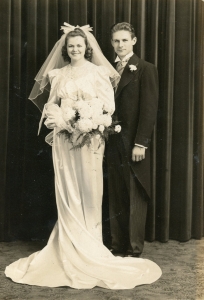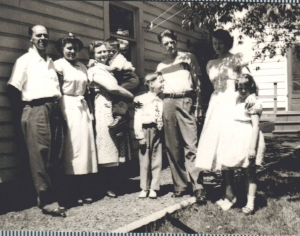Louise Paula Busch
November 25, 1922 – September 9, 2018
Place of birth: Wald, Friedenkamperstrasse, Germany
Name at birth: Luise Paula Grundke
Date of birth: November 25, 1922
Date of Baptism: February 23, 1922 in Wald (means forest)
Mother: Paula Grundke, certificate of citizenship: April 29, 1938
Father: Paul Grundke, certificate of citizenship: February 14, 1933

Louise, age 4, and her sister, Irene, age 6, came to the United States along with their mother, Paula Grundke, née Busch, in 1925. Her father, Paul Grundke, a skilled medical instrument craftsman from the world renowned “City of Blades”, Solingen Germany, had come over to a waiting job a year earlier. During that year, Paul lived with his sister Anna and her husband, Hugo Bovensiepen, while he saved up the money to bring over Paula, Irene, and Louise. By 1925, having saved enough for their passage and an apartment of their own, he sent for them.
The passage to New York City from Amsterdam took six days, and Louise remembered them as being very rough and stormy. She recalled most of the passengers, including her mother and sister, becoming very seasick, with many clinging to the ropes that had been strung along the decks to keep people from being swept overboard. Louise, however, did not get seasick. She remembered swinging from and doing somersaults on the ropes, and being endlessly doted on and fussed over by those of the crew and other passengers who’d avoided seasickness.
Once they’d arrived in the USA, and Paul had gotten the family settled, Paula did what she would have done in Germany with kids of that age: she took them to school. Louise was just 4 years old and Irene was 6 and Paula spoke no English, so when the principal explained to Paula that Louise was still too young for school in the USA, Paula understood not a word. Eventually Paula simply nodded, smiled politely, and left, leaving both girls there for the principal to deal with. Louise quickly learned English from the other children, and turned out to be an excellent student, even skipping a couple of grades and graduating early.
During that time, other German relatives also emigrated, and Louise recalled many of them fondly—especially Tante Anna and Onkel Hugo, who didn’t have any children of their own, and spoiled both Louise and Irene mercilessly.
Meanwhile, Louise’s father had joined a local singing society in Elizabeth, New Jersey. After each performance, the group held a dance. and it was at one of those dances, at the age of 17, that Louise met her husband to be, William Busch. He was, she said, a very good dancer, and while it wasn’t quite “love at first sight”, she admitted, it was close enough to make marriage inevitable. On December 6, 1941, at St. Peter’s Roman Catholic Church in Newark, NJ, they were married. The following day, the Japanese bombed Pearl Harbor,
In January William enlisted in the US Army. Based on his education and chemistry background, he was assigned duty as an Army Medical Corps lab technician, training at a facility in Staten Island, NY, and then rotating frequently between several stateside facilities. As a result, Louise was often able to visit him, and back home, on October 22, 1942, Louise gave birth to their first child, a boy, Richard. As the family’s firstborn American, both sets of grandparents set out to spoil him thoroughly, and Louise did her best to keep it from getting completely out of hand.
One year and one week later, on October 29, 1943, a second child, a girl, Elizabeth, was born. There were now two grandchildren to spoil mercilessly, but again Louise worked to keep things from getting out of hand. Eight years later, on December 9, 1951, a surprise visitor arrived—a third child, a boy, Stephen. The family was now complete.
In the 50’s, William began playing soccer with the Elizabeth Sports Club, and Louise joined the Ladies Auxiliary. Louise had worked as a bookkeeper for Prudential Insurance in Newark before meeting William, and was soon drafted to become the team’s bookkeeper. The team and the club thrived, and Louise and Bill (as he was now commonly called) made dozens of new friends they would keep for a lifetime.
In 1965, Elizabeth SC formed a holding company and purchased its long-time playing field and clubhouse, Farcher’s Grove. Between the bar and restaurant, and hosting parties, dances, weddings, and celebrations of all kinds, Louise and her friends were kept busier than one-legged tap dancers. And Louise loved it all.
Later, Louise and Bill would move to a waterfront home in Green Island. In 1999, rising real estate values forced the Elizabeth SC to sell Farcher’s Grove, and being unable to find an affordable new home field, the club came to an end. But not the friendships. Those endured to the end, and they all met frequently at one or another of their homes.
Bill and Louise then move to Bamber Lake, into the home where her sister Irene, now deceased, had lived. Friends and families visited often, there were parties and celebrations, they were happy. The two person business they had started in Union, Busch Technical Sales, now became C.A.P.E., Inc, with Bill remaining as Head of Sales and Louise as CFO.
Several years later, when they finally retired, they decided they wanted a smaller, more manageable home, so in in February of 2001 they moved a few miles up the road to Crestwood Village in Whiting. For Bill, it was a short-lived move. He became ill and was diagnosed with Myelodisplasia, a type of blood cancer, and in May 2001, he passed away.
Louise loved her independence and chose to remain in Whiting. It was within a short distance of her children’s homes, and the peace and quiet gave her the time and opportunity to pursue her favorite activity: reading. She’d been an avid reader all her life and now she could indulge that passion to her heart’s content.
Over the succeeding years, the condition of her legs deteriorated to the point that she had to use a walker, but she was adamant in her determination to live on her own as long as possible. That point came in 2016 after her eyesight began to deteriorate badly, and after a series of falls and hospital visits. She hated hospitals, so she said goodbye to Whiting and moved into an apartment in the home of her son Richard and his wife Sharon—where she passed away two years later in 2018.
She will forever be missed by all who knew her, and by a world that desperately needs all the good people it can get.
Stories From Oma
About Oma’s Father
About Tante Anna & Onkel Hugo
The Boat Ride from Holland
More About the Boat Ride and Going to School
How Oma and Opa Met



